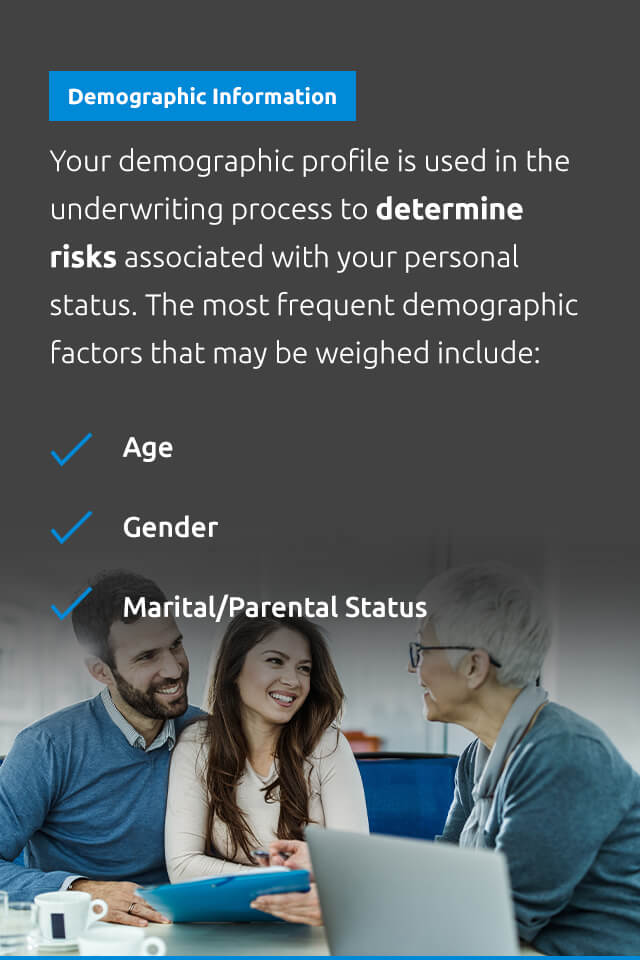
Shopping or applying for life insurance is not as daunting or emotional as it seems. It is also not always as expensive as many people believe it is, as half of Americans tend to overestimate the cost of life insurance. Knowing how the process works and what options are available to you may be faster and easier to get the coverage you need. Many people might not know that to be approved for life insurance, you must go through the process of underwriting first.
The life insurance underwriting process helps outline details about your life, including personal, financial and health information. Your life insurance company will collect this information to determine if your application should be approved and how much policy coverage they will offer you. The underwriting process will also help decide your premium rate, so it’s essential to know the factors considered in this procedure.
Underwriting is the process of evaluating risk when applying for any life insurance service. The risks are associated with personal health and lifestyle factors that determine your insurance premiums, coverage and category. A few main types of underwriting in the life insurance application process assess your risk based on given information. The underwriter will require varying details depending on which policy you apply for.
Guaranteed issue refers to life insurance offered to nearly all applications seeking life insurance. Any eligible applicant in the underwriting process will be accepted without answering questions about their health status or taking any medical exams. This type of life insurance is simplified and processed quickly depending on the insurance company because many people qualify for this kind of coverage. However, guaranteed issue life insurance is often more expensive, as it’s usually reserved for those in poor health, resulting in lower face value policies.
Simplified issue life insurance is a step up from guaranteed issue, where some health questions are required during underwriting, but a medical examination is not. Those who apply for simplified issue life insurance will have to answer questions about their health or other risks. Many people who apply for life insurance are often qualified for both guaranteed and simplified issue life insurance, so the rates for both tend to be high, as the risk is higher.
Insurance companies may also label you a risk if they do not have your extensive health history or knowledge from a medical exam or other information.
No medical exam life insurance underwriting is similar to guaranteed and simplified issue insurance as there is no required medical exam. However, the insurer will require more detailed information about your personal background, health and financial history during the underwriting process. For example, eligible applicants for no medical exam life insurance may need a background check to confirm if there is any criminal history, driving or financial risks. The underwriter may also want a review of your medication history or access to certain medical records.

The premiums for no medical exam underwriting can be lower than both simplified and guaranteed issue policies, depending on personal factors and the company you choose.
Fully underwritten policies, unlike the previous three, require a medical exam. Compared to the other three policies, this one is the most comprehensive and consists of very high face value policies. This underwriting process for life insurance combines a wide range of information, such as credit history, medical records, background checks, prescription history and medical questions. The medical examination for fully underwritten policies often requires blood and urine samples, physical measurements, blood pressure readings, an EKG and other tests. This type of life insurance policy is recommended for eligible younger and healthy applicants, as a complete medical examination with positive results will undoubtedly provide a lower premium rate.
Contact Us for More Information
During the underwriting process, applicants deemed a risk may be denied coverage, have a higher premium or not get the coverage they desire. If you were to die before the end of your policy’s term, then your insurance carrier would have to pay the death benefit. When you are seen as an at-risk applicant, this means your insurance carrier may label you under their specific guidelines for risk, as they differ for each company. Insurance companies and underwriters must assess many different possibilities and factors for risk to be determined. These factors will help determine what your coverage and rate will be. Here are the most common factors considered during the underwriting process.

Your demographic profile is used in the underwriting process to determine risks associated with your personal status. The most frequent demographic factors that may be weighed include:Age: Age is one of the most significant factors considered in underwriting to determine risk. The older you are when you buy or apply for a policy, the closer you are to more health problems and even death, which usually makes your rate higher. Gender: It is statistically known that women live longer than men. This means premiums may generally be lower for women and higher for men depending on other factors. Marital/Parental status: Though marital and parental status won’t often influence your premium rate, they may be required to help insurers determine coverage for dependents and which policy is right for you and your family.
Your physical health is another important factor that insurers weigh when approving or declining coverage. The more health problems you have, the more you will be deemed a risk, which can raise your premium. Some physical health factors that may be assessed during the underwriting process include:Medical history and examination: Your underwriter or insurer will want an overview of basic physical health history information, and some require a medical exam. This often includes height, weight, cholesterol, bloodwork, blood pressure, disclosure of any prior or current diseases, serious illnesses or other questions and tests. The reason for an analysis of your health history is to determine any health risks. Healthier people tend to live longer, so insurers may offer a lower premium for better results. Family health history: Life insurance companies may want to know of any genetic or hereditary diseases that run in your family, such as diabetes, Alzheimer’s disease, cancer, heart disease or other illnesses. Tobacco and alcohol use: Smoking is a high-risk habit many insurers look for. Applicants who smoke will pay higher rates across the board, typically about $1,000 more annually than those who don’t. A history of extensive alcohol or substance use or abuse may also influence insurance risk and rates.
A financial health assessment can show insurers how likely you will pay your premiums on time. Insurers want to be confident in their applicants and ensure they will be responsible for their life insurance payments. Life insurance companies can ask questions about your financial health, ask for proof or view public records to verify the information you give them. Financial health checks will also display any financial risks or negative history that help determine your insurability. Financial position: This is a basic overview of your financial history, such as your real estate purchases, public financial records or other information that reflects your financial health. Credit report: Your credit history and current credit score will let your insurer know if you have had issues paying back loans or have consistently late credit card payments. Very poor or very good credit scores may affect your life insurance rate. Income: Annual income helps your underwriter and insurer determine if you will keep up with your life insurance payments at the amount of desired coverage. Bankruptcy: Past bankruptcies in your credit history may hinder you from being accepted for a life insurance policy. Some insurance companies may require you to wait a few years after bankruptcy before applying again or give you higher rates.
Many aspects of your lifestyle can influence your risk classification, premium rate and coverage. As with the other factors involved in the underwriting process, applicants who live a healthy, relatively risk-free lifestyle are more likely to have lower premiums. Those with dangerous careers, hobbies and driving histories may see higher rates or be denied coverage altogether. Foreign travel: Insurers may consider your travel plans because there are many risks when traveling to some world regions. Traveling to countries with a high mortality rate or lack of access to medical facilities for long periods of time can affect your rate and coverage.Daily activities: Underwriters may want to inquire about your daily activities and how well you can get around. This may help determine if you will need in-home assistance in the near or distant future, which may flag you as a health risk. Occupation: Some jobs are more dangerous than others and present a higher risk for accidental death. Some high-risk applicants can include miners, farmers, construction workers, loggers, pilots, roofers, electricians and truck drivers. Hobbies and habits: Your favorite hobbies may be dangerous or life-threatening and raise your premiums. These hobbies and habits could include sky diving, rock climbing, flying in helicopters, scuba diving, hang gliding, motorcycle riding or even hunting and fishing. Driving and criminal record: If you have a history of DUI’s, speeding tickets and at-fault accidents, your insurer will want to know. Any criminal history may also be inquired about during the underwriting process. Prior applications/purpose for life insurance: If you have applied for life insurance coverage in the past and were denied, your current insurance company will want to know why. This could relate to financial or physical health reasons. Insurers may also want to know your reasoning for applying for life insurance.
Many applicants may wonder, how long is the underwriting process? It’s different for each person and each policy. Every life insurance company takes a unique approach to underwriting guidelines and risk classification systems. The information insurers require from applicants can also vary widely from person to person. Life insurance underwriting can be completed anywhere from a few minutes, days, weeks, or months. Certain factors can slow down this process, leading to a longer wait time for approval.
The underwriting for each policy varies based on the amount of information or proof required for specific insurance needs. Guaranteed issue: The process for guaranteed issue life insurance is often quick because it is one of the easiest policies to get accepted for. This policy’s application and approval times can range from a few minutes to a few days but may take up to several weeks. Simplified issue: From application to approval, simplified issue life insurance is similar to guaranteed issue life insurance. It often only takes a few minutes or no more than a week to process. However, it can also take a few weeks, depending on the company. No medical exam life insurance: The application and approval process for no exam policies can be completed in 24-48 hours or up to a few weeks. Some of these policies can be approved in about 15 minutes. Fully underwritten: With full underwriting policies and a medical examination, approval times may be longer. It may take you anywhere from a few days to a few weeks to secure a medical examination appointment. If your insurer requires medical records from your physician, it may take an additional 2-8 weeks or longer to ensure all necessary information is collected and verified.
The length of each process for underwriting varies so widely because there are additional factors that can influence or delay your life insurance application and approval. Here are the most common factors that lead to a longer processing time for life insurance.

The insurance company you choose can affect how long you wait for life insurance approval. Every insurance company has different requirements and policies, so it may be a good idea to shop around and see which one works best for your needs. Several insurers may offer a faster turnaround time, known as accelerated underwriting, which may work for you. It’s important to explore your options and research different insurance companies to determine which one will give you the best coverage for the best price.
Any health problems left out of your application, either accidentally or purposefully, can negatively affect your life insurance approval. If the health problem you forgot to disclose is minor, it may only cause a slight delay once everything is confirmed with your medical records or examination. However, if you did not disclose a history of substance abuse, serious genetic disease or a high-risk habit, such as smoking, it may take much longer to get approved. You may also be denied coverage or see a surge in your premium rate for specific health problems or habits. However, if your application is accurate and verified, it still may take a while to process and get approval. You will need a medical examination for some policies, so you will have to make an appointment. Then, your insurer may also want to order your medical records and review them to ensure no missed health risks. Between obtaining your records from your physician and assessing them, it may take your underwriter anywhere from several weeks to a few months to thoroughly analyze your records. Inconsistencies in your medical records can also delay your processing and approval time as your insurer may want additional confirmation, proof or records.
How you apply for life insurance may slightly influence the application process and turnaround time for approval. For example, depending on where you live and which insurance company you choose, you may apply for life insurance online, over the phone or in person. Typically, applying online is the fastest way to submit an application, as it can be done from any location. Online sales for life insurance increased from 17% in 2011 to 29% in 2020, so this method is becoming increasingly popular. Suppose you have to drive to your insurance company or call to submit an application over the phone. In that case, it may take longer if staff members are busy assisting other applicants and customers.
Finding the right, high-quality life insurance coverage at an affordable cost is important. At David Pope Insurance, we help make the process easy with our customizable, flexible quotes. Our family-owned company and local agents have over 20 years of experience. We do the shopping around for you to offer the lowest premiums and rates. Our goal is to provide you with financial security stemming from the best life insurance for you and your family. We also offer disability and pet insurance to cover all of your bases. For more information about our life insurance services, contact us today. We also invite you to visit our website and request a quote for your custom life insurance policy.
